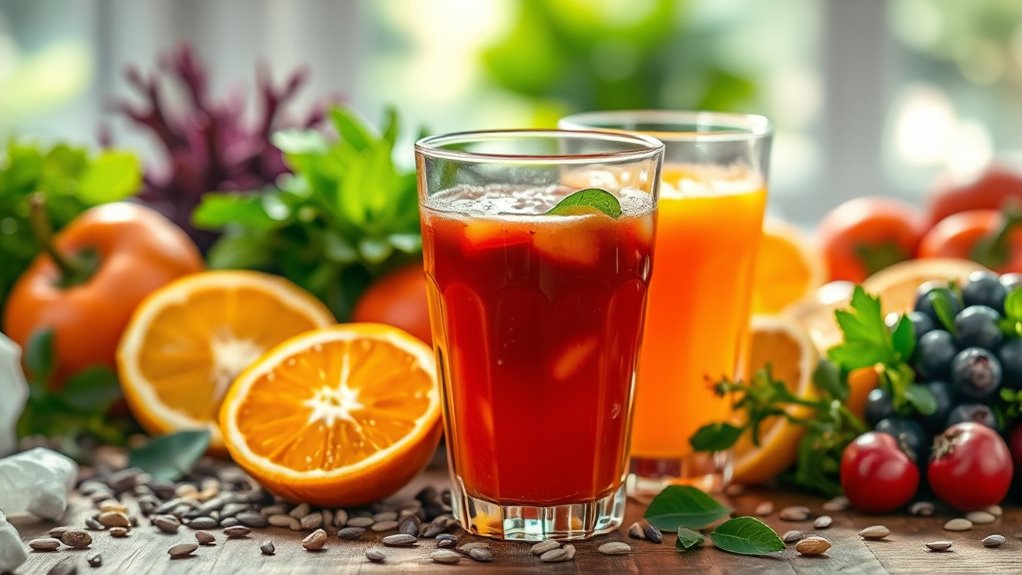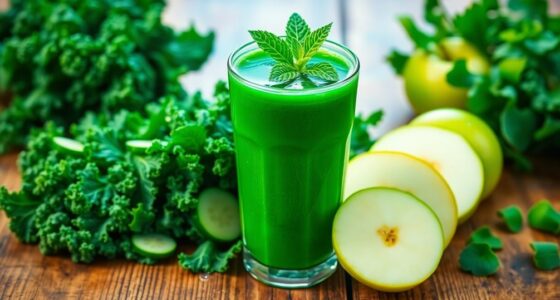Juicing can supercharge your digestion by providing a concentrated source of nutrients that your body absorbs quickly. Without the fiber found in whole fruits, juices allow for faster nutrient uptake, which might help those with digestive issues. However, it’s important to balance juices with fiber-rich whole foods to maintain overall gut health. Keep exploring the fascinating relationship between juicing and your body for more insights on how to optimize your digestive wellness!
Key Takeaways
- Juicing allows for faster nutrient absorption into the bloodstream, providing a concentrated source of vitamins and minerals essential for digestion.
- Green juices made from leafy vegetables can enhance digestion due to their high fiber content, aiding in gut health.
- Juicing can ease digestion for individuals with gastrointestinal issues, making it easier for them to consume vital nutrients.
- It provides a break from digesting fiber, which can be beneficial for those with certain health conditions.
- Combining juices with whole foods ensures a balanced diet while promoting better digestive health.
Understanding Juicing and Its Popularity
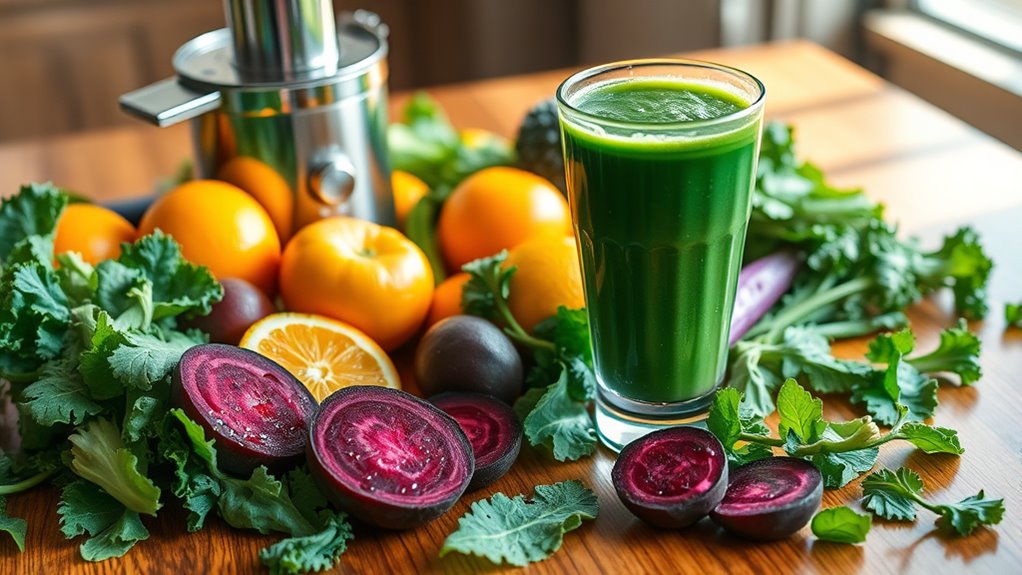
As juicing continues to surge in popularity, you might wonder what’s driving this trend. One major factor is the influence of celebrities and social media, where visually appealing juice photos can create buzz.
Many people are drawn to claims about juicing’s health benefits, particularly regarding gut health and reduced inflammation. However, it’s essential to remember that juicing often removes fiber from whole fruits and vegetables, which is important for digestive health.
While juicing might simplify nutrient intake, the lack of fiber can lead to misconceptions about its nutritional value. As you explore this trend, keep in mind that balance is key, and incorporating whole fruits and vegetables into your diet remains essential for ideal health. Additionally, green juice can enhance digestion due to its high fiber content from leafy greens.
Juicing vs. Whole Fruits and Vegetables: A Nutritional Comparison
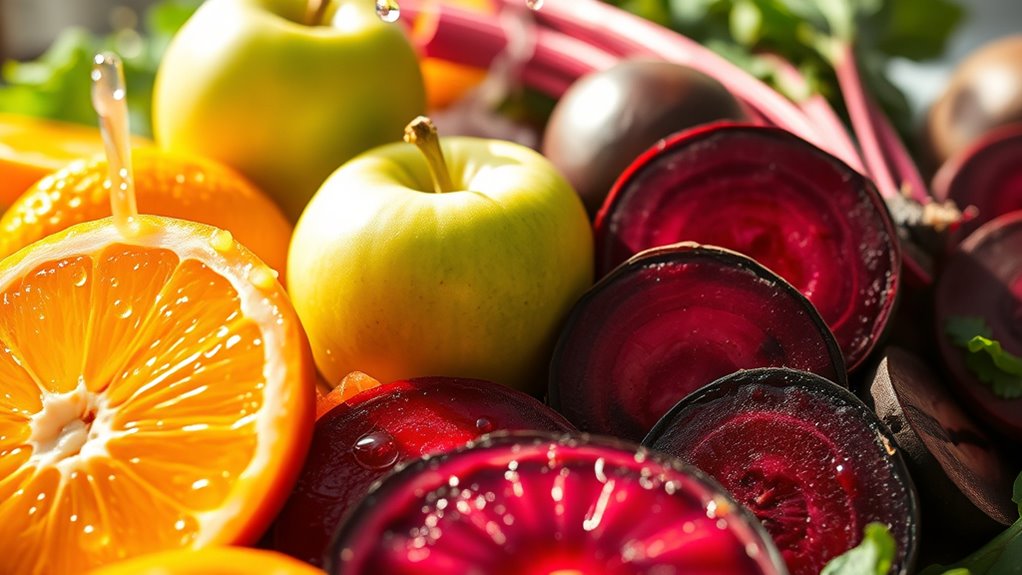
Juicing and whole fruits and vegetables each have their place in a healthy diet, but understanding their nutritional differences is key to making informed choices. Here’s what you need to know:
- Juicing removes beneficial fiber, essential for digestive health.
- Whole fruits provide vital nutrients linked to reduced chronic disease risk.
- Nutrient absorption from juices isn’t markedly better than whole produce.
- Juicing can help you include nutrients if you dislike whole fruits.
- A diet rich in whole fruits and vegetables promotes better health outcomes.
- Additionally, a balanced nutrition is crucial for overall health, as it ensures you’re getting all necessary vitamins and minerals.
While juicing can be a tasty way to get some nutrients, it shouldn’t replace the health benefits of consuming whole fruits and vegetables.
Aim for a balance to enhance your overall health!
The Impact of Juicing on Digestive Health
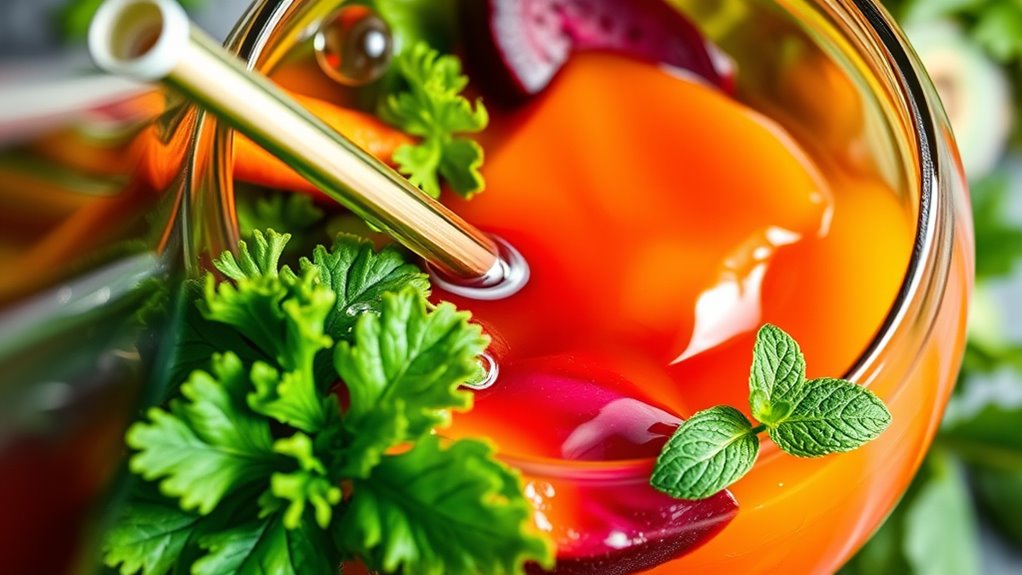
When you juice fruits and veggies, you may enjoy faster nutrient absorption, which can be a real boost for your health. However, the removal of fiber raises concerns about maintaining stable blood sugar levels and overall gut function. Let’s explore how these factors play a role in your digestive health and compare juicing with blending for a more balanced approach. Additionally, it’s important to remember that juice detoxes can lead to potential side effects such as fatigue and nutrient deficiencies if not managed properly.
Nutrient Absorption Benefits
While many people seek ways to enhance their digestive health, the nutrient absorption benefits of juicing stand out as a compelling option. Juicing makes vitamins and minerals more readily available, especially for those with digestive sensitivities. Here’s how it can help:
- Provides a rapid influx of nutrients into your bloodstream.
- Offers a concentrated source of vitamins and minerals.
- Eases digestion for individuals experiencing gastrointestinal issues.
- Facilitates easier consumption for those undergoing medical treatments.
- Helps improve overall nutrient intake when balanced with whole fruits.
However, remember that while juicing boosts nutrient absorption, it lacks essential fiber, which is vital for ideal gut health and blood sugar regulation.
Balancing juices with whole foods is key for overall wellness.
Fiber Removal Concerns
Removing fiber from fruits and vegetables can greatly impact your digestive health. When you juice, you strip away insoluble fiber, which is vital for maintaining a healthy digestive system.
Without this fiber, you might experience digestive issues like constipation and an imbalance in gut health. Whole fruits and vegetables provide the fiber needed to regulate blood sugar levels, while juices can lead to rapid spikes.
Studies highlight that diets rich in fiber from whole foods are linked to a lower risk of digestive disorders and better health outcomes overall. Additionally, incorporating unique homemade fruit juice recipes can offer a refreshing way to enjoy fruits while still emphasizing the importance of whole foods.
While juicing can simplify digestion for some, it shouldn’t replace the fiber-rich foods essential for peak digestive health. Don’t overlook those whole fruits!
Blending vs. Juicing
Juicing and blending both offer unique benefits for digestive health, but they serve different purposes. Here’s how they compare:
- Juicing removes insoluble fiber, making nutrients easier to absorb quickly.
- Blending retains fiber, promoting satiety and better blood sugar stability.
- Juicing can benefit those with digestive issues by providing a break from fiber digestion.
- Smoothies, being blended, help maintain gut health and regulate blood sugar.
- Cranberry juice is rich in antioxidants, which can also aid in digestive health when consumed appropriately.
For peak health, you need both whole foods and blended options to support digestion.
Incorporating both juicing and blending into your routine can maximize nutrient intake while ensuring you also enjoy the benefits of fiber.
Balance is key in achieving the best digestive health!
Risks and Misconceptions of Juice Cleanses
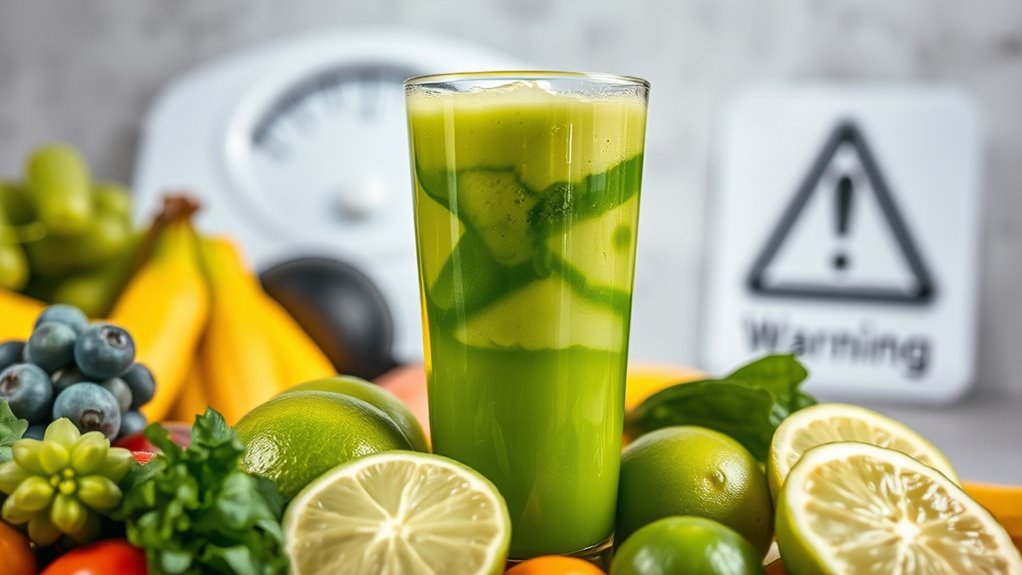
When you hear about juice cleanses, it’s easy to get caught up in the detoxification hype, but the truth is your body already does a great job of detoxing on its own. These cleanses often lead to nutritional deficiencies since you’re missing out on solid foods that provide essential nutrients. Plus, the high sugar content in fruit juices can spike your blood sugar, which isn’t ideal for everyone. Additionally, relying solely on juices can decrease your energy independence as it limits your intake of balanced, whole foods essential for optimal health.
Detoxification Myths Debunked
What makes juice cleanses so appealing to many people? The promise of quick detoxification and rapid weight loss can be irresistible. However, these claims are often myths.
Here are some common misconceptions:
- The body detoxifies itself without juice.
- Juice cleanses lack essential nutrients.
- Initial weight loss is mostly water, not fat.
- They can cause irritability and fatigue.
- Blood sugar levels may become unstable.
Health professionals don’t recommend juice cleanses due to these risks. Beet juice benefits can enhance blood flow, which supports healthy digestion, making it a better choice for overall wellness.
Instead of relying on juice for detoxification, focus on a balanced diet that supports your body’s natural processes.
Nutritional Deficiencies Risks
While juice cleanses may seem like a quick fix for detoxification, they often lead to significant nutritional deficiencies. By excluding solid foods, you’re missing out on essential nutrients and fiber found in whole fruits.
This low-calorie intake can leave you fatigued and irritable, as your body struggles to get the energy it needs. Prolonged juice cleanses can even disrupt your blood sugar levels, causing mood swings and energy crashes.
Additionally, without the benefits of fiber, you may experience poor digestion and irregular blood sugar regulation. Remember, whole foods support your body’s natural detoxification processes far better than juices alone. Furthermore, consuming juice without the fiber can lead to poor digestion and may not provide the same health benefits as eating whole fruits.
Benefits of Juicing in a Balanced Diet
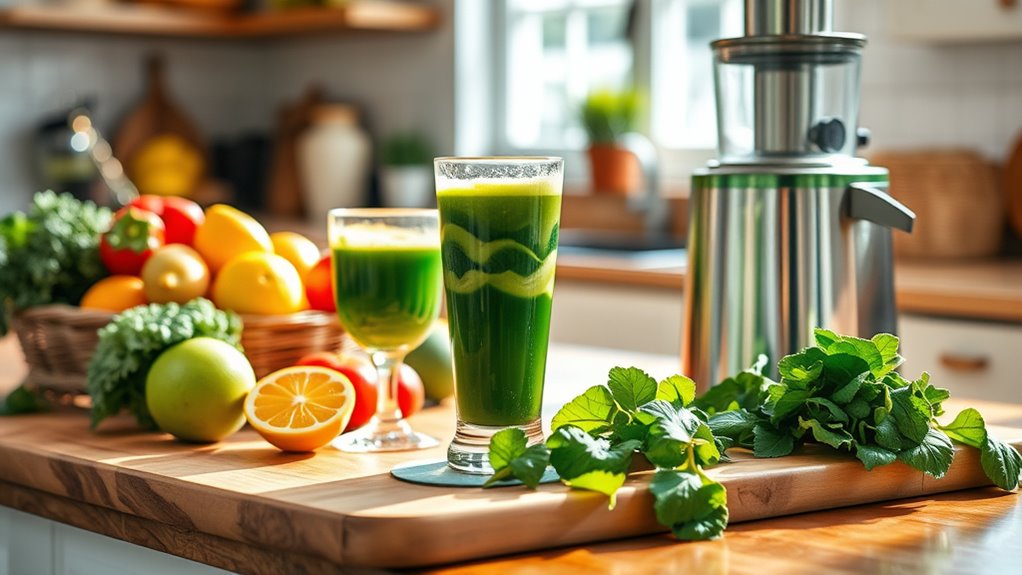
Juicing can serve as a valuable addition to a balanced diet, especially for those who find it challenging to consume enough fruits and vegetables.
Juicing is a beneficial way to enhance your diet, especially for those struggling to eat enough fruits and vegetables.
Here are some benefits of incorporating juicing into your routine:
- Increases nutrient intake for those averse to whole fruits.
- Provides a break from digesting fiber, aiding digestion for some health conditions.
- Freshly made juice maximizes nutrient absorption when consumed immediately.
- Complements a fiber-rich diet, promoting better digestive health.
- Acts as a convenient way to enjoy a variety of fruits and vegetables.
- Additionally, juicing can help individuals meet their daily nutritional needs by incorporating essential vitamins and minerals found in fruits and vegetables.
How Juicing Affects Blood Sugar Levels
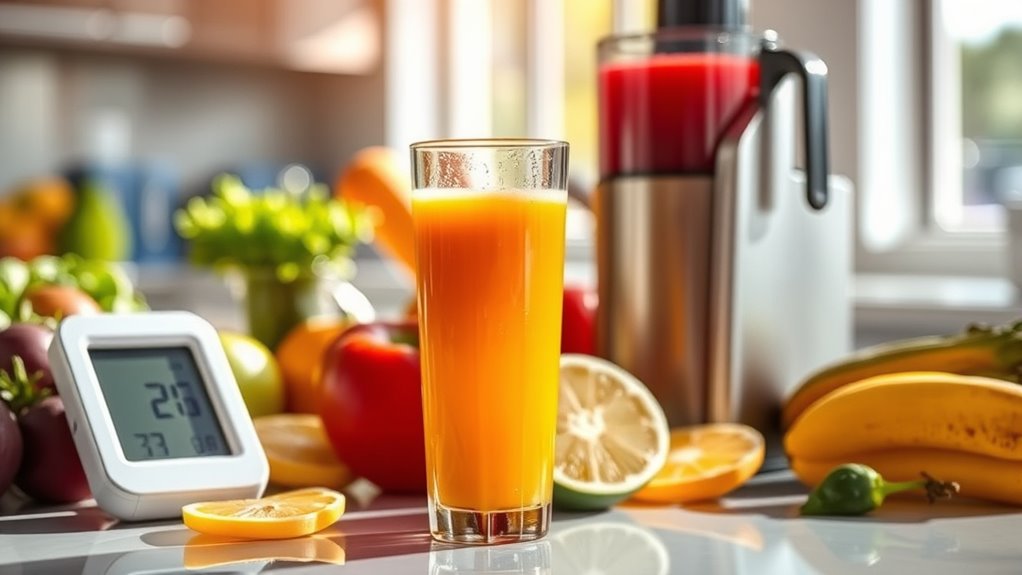
As you explore the impact of juicing on blood sugar levels, it’s important to understand that removing fiber from fruits and vegetables can lead to quick spikes in blood sugar.
When you drink fruit juice, the sugars are absorbed rapidly into your bloodstream, causing fluctuations that can leave you feeling drained and moody. High-sugar fruit juices may even contribute to insulin resistance over time, increasing your risk of type 2 diabetes.
Juices made primarily from fruits often have a high glycemic index, raising blood sugar levels more than whole fruits.
To help mitigate these spikes while still enjoying the benefits of juicing, consider incorporating more vegetable-based juices, aiming for a 3:1 ratio of vegetables to fruit, especially if you’re focused on weight loss.
Blending: The Fiber-Rich Alternative
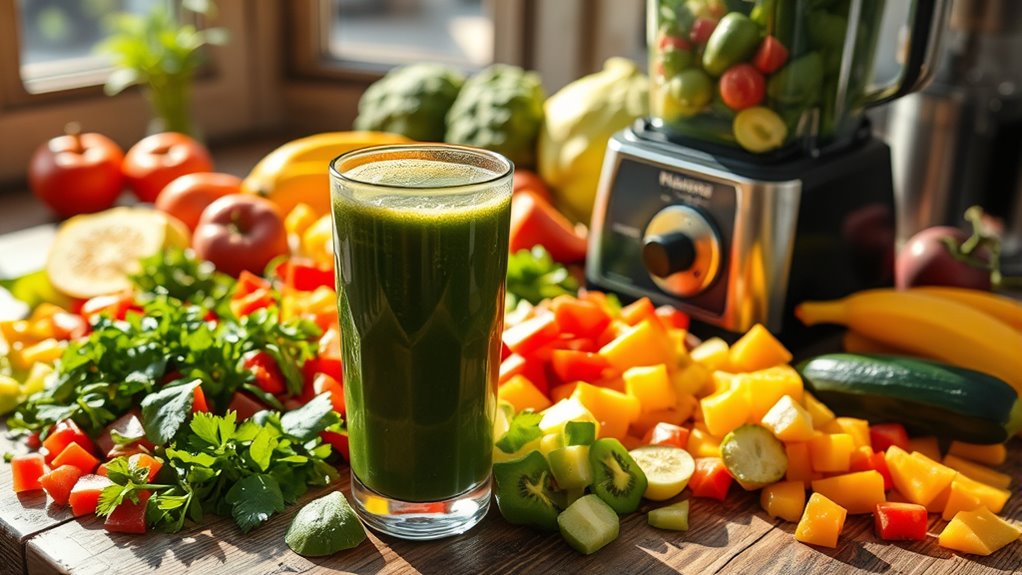
Here’s why blending could be your go-to choice:
Blending whole fruits and vegetables is an excellent way to stabilize blood sugar and enhance overall health.
- Stabilizes blood sugar levels by slowing glucose absorption.
- Promotes a feeling of fullness, helping with weight management.
- Enhances nutrient bioavailability, supporting gut health.
- Allows for creative combinations with proteins and healthy fats for balanced nutrition.
- Offers a convenient way to consume whole foods while engaging your digestive processes.
- Increases dietary fiber intake, which is crucial for digestive health and can improve overall well-being.
Incorporating fiber-rich blended smoothies into your diet can be a game-changer for managing blood sugar and promoting overall well-being.
Making Informed Choices: Juicing and Health
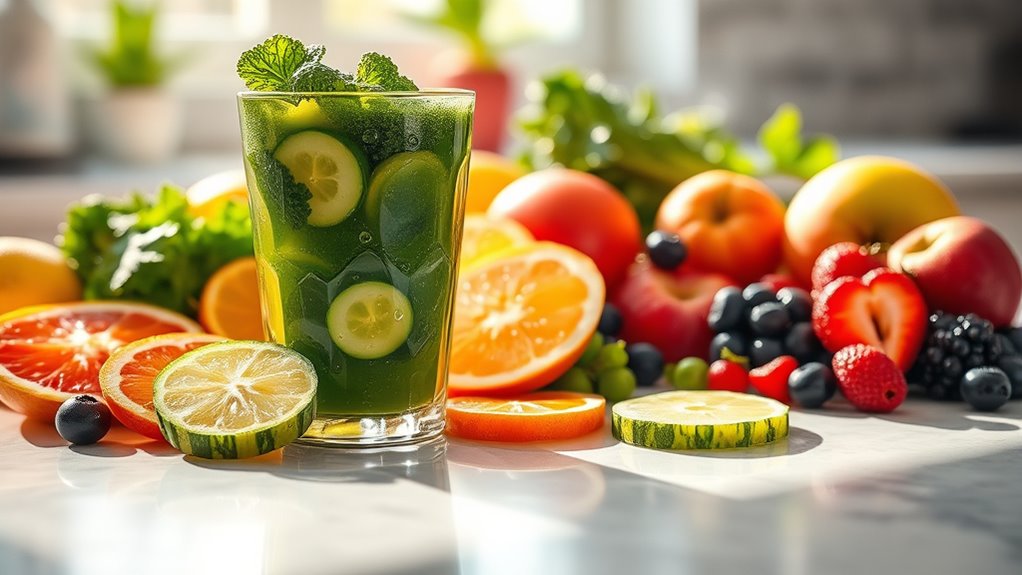
While you may be drawn to the vibrant appeal of freshly squeezed juices, it’s essential to weigh their benefits against potential drawbacks. Juicing can simplify digestion, especially for those with gut sensitivities, allowing for rapid nutrient absorption.
However, it lacks the fiber found in whole fruits, which is vital for digestive health and regulating blood sugar levels. Without fiber, you might experience spikes in blood sugar, making whole foods a better choice for overall wellness.
Additionally, freshly made juice should be consumed immediately to avoid bacterial growth, raising food safety concerns. Health professionals generally recommend focusing on fiber-rich options and whole foods instead of relying heavily on juicing as your primary source of nutrition.
Make informed choices for your health!
Frequently Asked Questions
Is Juicing Good for Your Digestive System?
Juicing can benefit your digestive system by providing a quick source of vitamins and minerals, especially if you have digestive issues.
It removes insoluble fiber, allowing your body to absorb nutrients more rapidly. However, it’s important to note that juicing lacks the essential dietary fiber needed for gut health.
To support digestion effectively, consider blending fruits and vegetables into smoothies, which retain more fiber and nutrients compared to juicing.
What Are 5 Cons of Juicing?
Juicing can seem appealing, but it comes with significant downsides.
First, you’re missing out on essential fiber that aids digestion.
Second, you might face nutrient deficiencies without balanced whole foods.
Third, the high sugar content can spike your blood sugar, leading to crashes.
Fourth, extreme hunger and fatigue may follow a juice cleanse.
Finally, relying on juices can disrupt your healthy eating habits, making long-term dietary changes tougher to maintain.
How Long Does It Take to See the Benefits of Juicing?
You can start feeling the benefits of juicing within just a few days. Many people notice increased energy and improved hydration as their bodies rapidly absorb nutrients.
If you have digestive issues, you might experience relief from symptoms like bloating or discomfort in just 24 to 48 hours.
However, for lasting health benefits, it’s essential to incorporate juicing into a well-balanced diet that includes whole fruits and vegetables. Consistency is key!
Which Juice Is Better for Digestion?
When it comes to juicing for digestion, you’ll want to grab that vibrant green juice!
Spinach and kale juices are like a superhero for your gut, packing in nutrients that your body will thank you for.
Carrot juice is no slouch either, bursting with beta-carotene that keeps your digestive system humming.
Toss in some ginger or lemon, and you’ve got a digestion dynamo!
Just remember, drink it fresh for the best results!
Conclusion
In the vibrant world of nutrition, juicing can be a powerful ally for your digestion, but remember, it’s not a silver bullet. Like a double-edged sword, it’s essential to balance juices with whole fruits and veggies to reap the full spectrum of benefits. Think of juicing as an invigorating splash of flavor that can enhance your diet, but don’t let it drown out the richness of fiber. Embrace moderation, and your gut will thank you!
Cindy thoroughly researches juicing trends, techniques, and recipes to provide readers with practical advice and inspiration. Her writing style is accessible, engaging, and designed to make complex concepts easy to understand. Cindy’s dedication to promoting the advantages of juicing shines through her work, empowering readers to make positive changes in their lives through the simple act of juicing.

